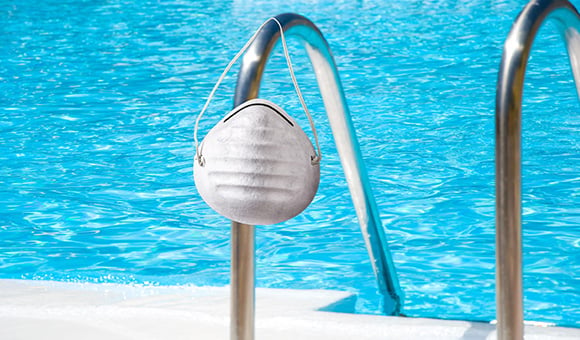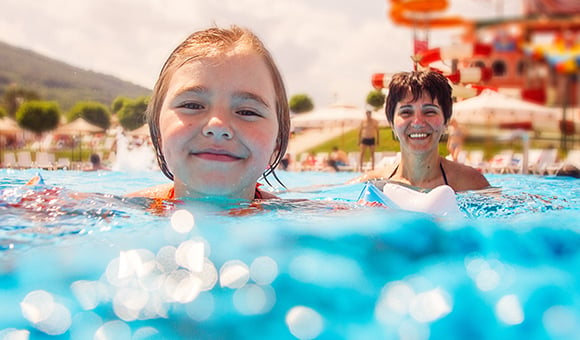Although outbreaks of certain respiratory pathogens, such as Legionella, have been linked to recreational water (often due to improper maintenance of chlorine levels), the US Centers for Disease Control and Prevention (CDC) states that it is not aware of any scientific reports showing that SARS-CoV-2, the causative agent of coronavirus disease 2019 (COVID-19), spreads through water in pools, hot tubs, water playgrounds or other treated aquatic venues.1
Despite these statements, the public remains concerned about waterborne transmission of the virus. In a 2021 survey, 52 percent of Americans worry about COVID-19 at public pools, and among that group, 82 percent are especially concerned about large crowds at the pool.2

Now, findings from a study conducted in the UK may help to allay those fears. Published in the journal Water Research, the study provides a better understanding of how proper chlorination and pH control safeguards recreational waters from the spread of SARS-CoV-2.3 Solenis scientists (formerly from Sigura Water) contributed technical expertise to the project.3
Analyzing Waterborne Transmission Potential
Although airborne transmission is accepted as the primary route of spread of SARS-CoV-2, many have also proposed waterborne transmission as a secondary route. Evidence for this comes from the fact that many COVID-19 patients have shown gastrointestinal symptoms, leading researchers to search for viral RNA in the feces of infected individuals. SARS-CoV-2 RNA has been identified in fecal samples, and it has also been detected in untreated wastewater around the world.4
Even in untreated water, SARS-CoV-2 viruses don’t persist indefinitely. Some research has shown that coronaviruses are more sensitive to temperature variations and, 99.9 percent of the viruses were inactivated in two or three days in wastewater at 2°C.5 In water treated with chlorine, inactivation occurs more rapidly. However, prior to this recent study, headed by researchers with the Department of Infectious Disease at Imperial College, London, the effect of chlorinated swimming pool water on inactivation of SARS-CoV-2 had never been directly demonstrated. Its findings clearly illustrate the level of chlorine’s efficacy in the inactivation of SARS-CoV-2.3
Successive Experiments Performed
In the study, researchers took up to one-liter water samples from various swimming pools and modified them in the laboratory to have a range of pH and free chlorine values. Next, a known amount of infectious SARS-CoV-2 was added to duplicate water samples. After 30 seconds of incubation, any remaining infectious virus was then titrated on monkey-derived cells known as Vero cells using the TCID50 assay, which stands for Median Tissue Culture Infectious Dose and measures the survival of viruses after treatment.
Successive experiments were performed with varying free chlorine levels, varying pH, a range of both pH and free chlorine levels, and an independent preparation of virus at a range of pH and chlorine levels. In addition, a phosphate-buffered saline (PBS) control was included in each experiment to validate the infectivity of the virus input.
Achieving Inactivation
The findings of the study show the importance of both chlorine levels and pH to achieve viral inactivation. To understand how inactivation occurs, it helps to understand viral structure. SARS-CoV-2 is known to be an enveloped virus, with a lipid membrane that surrounds a protein capsule consisting of protein and glycoprotein. Chlorine acts by penetrating the lipid membrane and reacting with the internal proteins to interrupt their ability to function normally. Once the internal proteins have been altered, the virus becomes inactivated.

The study found that lower pH and higher free chlorine levels result in greater inactivation of SARS-CoV-2. A pH of no more than 7.4 and free chlorine above 1.5 parts per million (ppm) resulted in at least a 3-log reduction (by at least 3 orders of magnitude) in infectious titer. The availability of active free chlorine decreases with increasing pH, and this was observed in the study, with some residual virus being detected after treatment in samples with water above pH 7.4, even when at least 1.5 ppm free chlorine was present.
Based on this data, the study authors made this conclusion: “Our findings on the susceptibility of SARS-CoV-2 to inactivation by swimming pool water underscore the importance for those who maintain swimming pools to adhere to UK guidelines for chlorination, and this should give confidence in the safety of bathers when in the water.”3
If you have any other questions about the efficacy of disinfection systems, please contact Solenis. Our pool and spa care portfolio includes a variety of water treatment solutions for amusement parks, community pools, hotels and resorts, and our scientists and application specialists will work with spa and pool owners to design a sanitizing solution that ensures the highest level of water cleanliness and health possible.
References
- CDC: Guidance for Public Pools, Hot Tubs, and Water Playgrounds During COVID-19 Updated Feb. 1, 2021.
- Pool & Hot Tub Alliance. (2021, May 12). Worried About COVID-19 at the Pool? Americans Are Split, Survey Finds [Press Release]. Retrieved from https://www.phta.org/media-center/newsfeed/worried-about-covid-19-at-the-pool-americans-are-split-survey-finds/
- Brown JC, Moshe M, Blackwell A, Barclay WS. Inactivation of SARS-CoV-2 in chlorinated swimming pool water. Water Res. 2021 Sep 30;205:117718. doi: 10.1016/j.watres.2021.117718.
- La Rosa G, Bonadonna L, Lucentini L, Kenmoe S, Suffredini E. Coronavirus in water environments: Occurrence, persistence and concentration methods - A scoping review. Water Res. 2020 Jul 15;179:115899. doi: 10.1016/j.watres.2020.115899.
- García-Ávila F, Valdiviezo-Gonzales L, Cadme-Galabay M, Gutiérrez-Ortega H, Altamirano-Cárdenas L, Zhindón-Arévalo C, Flores del Pino L. Considerations on water quality and the use of chlorine in times of SARS-CoV-2 (COVID-19) pandemic in the community. Case Studies in Chemical and Environmental Engineering. Volume 2, September 2020, 100049. https://doi.org/10.1016/j.cscee.2020.100049.